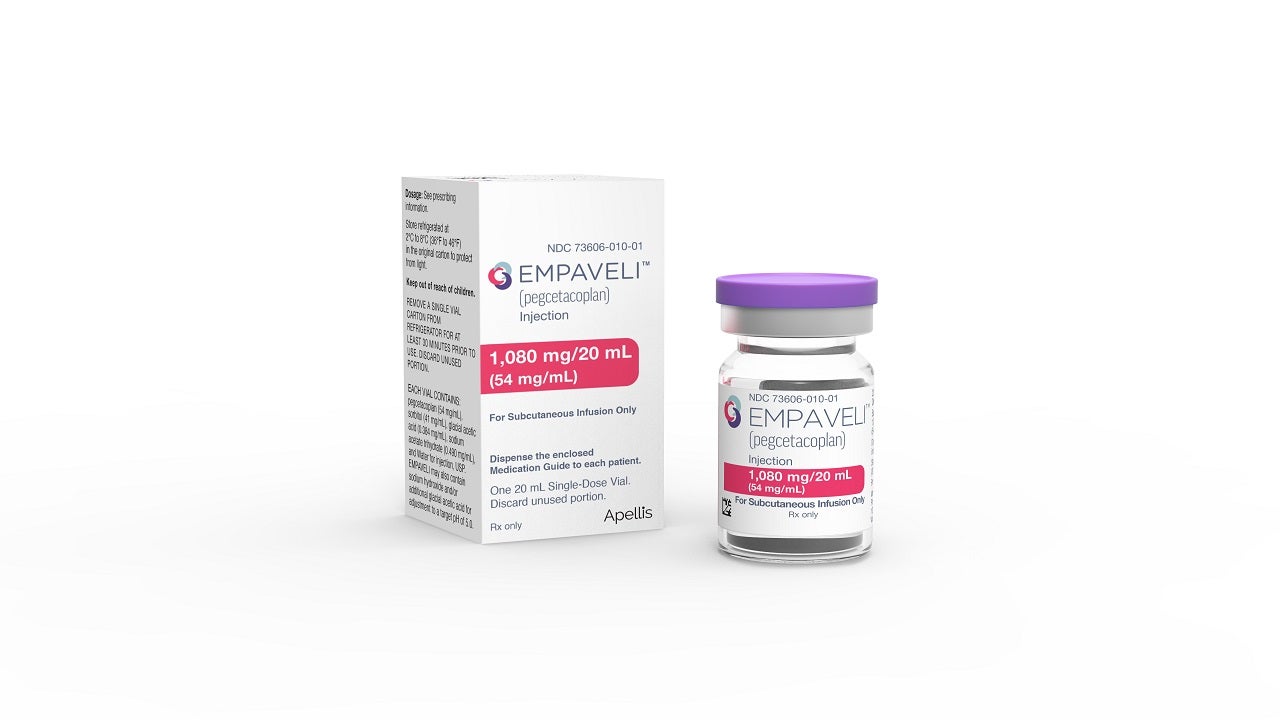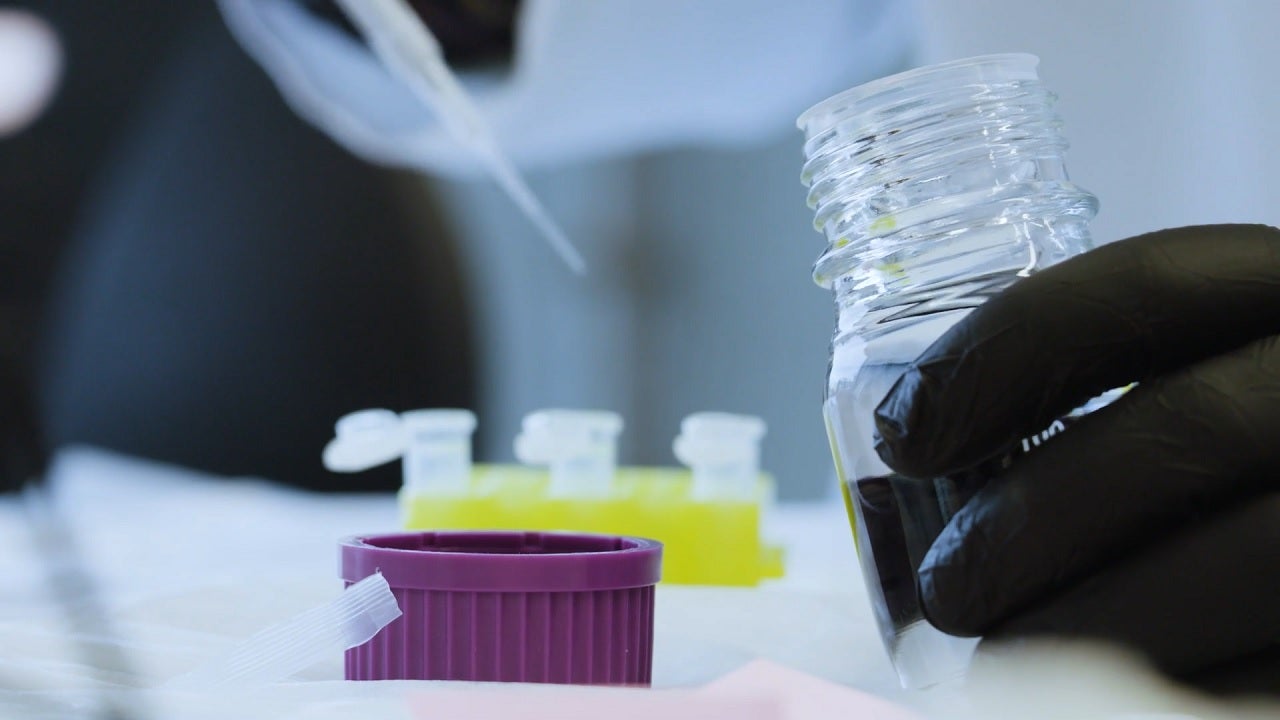EMPAVELI™ (pegcetacoplan) is the first and only targeted complement component 3 (C3) therapy indicated for the treatment of paroxysmal nocturnal haemoglobinuria (PNH) in adults.
Previously untreated patients with PNH and those transitioning from the C5 inhibitors Soliris® (eculizumab) and Ultomiris® (ravulizumab) are eligible to receive the therapy.
Developed by Apellis Pharmaceuticals, EMPAVELI is available as a sterile, clear, colourless to slightly yellowish aqueous solution of 1,080mg/20mL (54mg/mL) dosage strength in a single-dose vial. The drug is injected subcutaneously via a commercially available infusion pump with a reservoir of at least 20mL.
EMPAVELI approvals
In September 2020, Apellis submitted a new drug application (NDA) to the US Food and Drug Administration (FDA), and a marketing authorisation application (MAA) to the European Medicines Agency (EMA), for pegcetacoplan for the treatment of PNH.
In October 2020, the company collaborated with Swedish Orphan Biovitrum (Sobi) to fast-track the development and marketing of pegcetacoplan for the treatment of multiple rare diseases.
The FDA accepted and granted priority review designation for the NDA in November 2020 and granted approval to the therapy in May 2021. A decision on the MAA from the European Commission (EC) is expected in the second half of 2021.
Pegcetacoplan was previously granted fast track designation by the FDA for the treatment of PNH and geographic atrophy, and orphan drug designation for the treatment of C3 glomerulopathy (C3G) by the FDA and EMA. The drug also received orphan drug designation from the Australian Therapeutic Goods Administration (TGA) for the treatment of PNH.
Apellis has designed the ApellisAssist™ programme to provide treatment access and support to EMPAVELI patients throughout their treatment period. The programme provides comprehensive product support to eligible patients with product resources such as insurance support, education and training, financial assistance and services.
Paroxysmal nocturnal haemoglobinuria (PNH)
PNH is an acquired, rare, chronic and potentially life-threatening blood disorder characterised by haemolytic anaemia, blood clots and impaired functioning of bone marrow.
PNH is caused by mutations of the PIG-A gene that occurs in a bone marrow stem cell. The mutations lead to the deficiency of complement regulatory proteins in the blood cells responsible for protecting blood cells from the individual’s immune system. This causes unregulated complement cascade activation initiated at C3, the central protein in the complement cascade, and the destruction of red blood cells (haemolysis).
PNH is most often diagnosed in individuals between 35 and 40 years of age. There are two mechanisms of haemolysis in PNH, namely intravascular haemolysis (IVH) and extravascular haemolysis (EVH). IVH occurs in blood vessels, while EVH is found in the liver and spleen.
Although C5 inhibitors have demonstrated their efficacy to increase patient survival by treating IVH, many patients with PNH experience chronic haemolysis and constant low haemoglobin.
PNH can be severe for some patients, with a ten-year median survival following diagnosis, whereas some patients survive for decades with only mild symptoms.
Pegcetacoplan mechanism of action
Pegcetacoplan binds to complement protein C3 and its activation fragment, C3b, regulating C3 cleavage and the generation of downstream complement activation effectors.
EVH is mediated by C3b opsonisation in PNH, while IVH is facilitated by the downstream membrane attack complex (MAC).
Pegcetacoplan functions proximally in the complement cascade, regulating both C3b-mediated EVH and terminal complement-mediated IVH.
Clinical trials on EMPAVELI
The FDA’s approval of EMPAVELI was based on the results of a 16-week, multi-centre, randomised, open-label, active comparator-controlled Phase III clinical trial, PEGASUS, performed in partnership with SFJ Pharmaceuticals.
The study enrolled 80 adult PNH patients who were on a steady dose of eculizumab for at least three months and whose haemoglobin levels were lower than 10.5g/dL. The primary goal of the study was to compare the efficacy and safety of EMPAVELI (pegcetacoplan) with that of Soliris (eculizumab).
In the study, the patients initially received 1,080mg of EMPAVELI twice a week in addition to their regular Soliris dose for four weeks. Following this, they were randomised to receive either 1,080mg of EMPAVELI twice a week or their current Soliris dose for 16 weeks.
EMPAVELI met its primary goal and outperformed Soliris in the clinical trial. At week 16, patients treated with EMPAVELI showed an average increase of 2.4g/dL in their haemoglobin levels, while patients treated with Soliris showed an average decrease of 1.5g/dL in their haemoglobin levels. The normalisation rates for haemolysis were also higher in EMPAVELI-treated patients.
In addition, around 85% of EMPAVELI-treated patients were transfusion-free, compared to 15% patients treated with Soliris.
After completing the randomised controlled period (n=77), all patients chose to undergo the open-label EMPAVELI treatment period.
The most common severe adverse reaction reported in patients treated with EMPAVELI was infections. Other common adverse reactions were injection site reactions, diarrhoea, stomach pain, respiratory tract infection, viral infections and fatigue.





